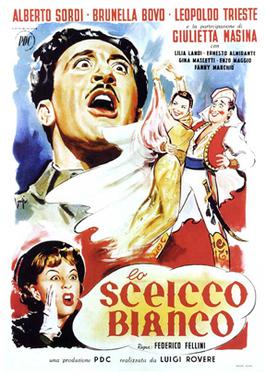Pages
▼
Saturday, December 5, 2015
The White Sheik (Federico Fellini, 1952)
This antic comedy was Fellini's first solo feature, based on a story by, believe it or not, Michelangelo Antonioni, collaborating with Fellini and Tullio Pinelli. Ennio Flaiano joined Fellini and Pinelli to write the screenplay, which is about a young couple from the provinces honeymooning in Rome. The husband, Ivan Cavalli (Leopoldo Trieste), doesn't know that his new wife, Wanda (Brunella Bovo), is an ardent fan of a fotoromanzo (a magazine serial that tells a story in photographs). When Wanda finds out that the serial, The White Sheik, is produced just around the corner from the hotel where she and Ivan are staying, she sneaks out in hopes of meeting Fernando Rivoli (Alberto Sordi), the actor who stars in the series as the sheik. Meanwhile, Ivan has scheduled their stay in Rome, including an audience with the pope, down to the minute, so when his family gathers to join the newlyweds and Ivan discovers that she has disappeared, madness ensues. Wanda finds herself swept up by the company photographing the next installment of the series and being wooed by the lecherous Rivoli himself. Ivan indulges in frantic attempts to cover up his wife's absence. Eventually he meets up with the prostitute Cabiria (Giulietta Masina), whose story Fellini will tell five years later in Nights of Cabiria (1957). For a first feature on his own, The White Sheik is remarkable, though it was quickly overshadowed by his next one, I Vitelloni (1953), which also featured Trieste in its cast. The White Sheik was only the second film for Trieste, who had appeared in a small role in Shamed (Giovanni Paolucci, 1947), for which he wrote the screenplay. He proved to be such an impressive character actor that he had a long career, with roles in such movies as Cinema Paradiso (Giuseppe Tornatore, 1988), The Name of the Rose (Jean-Jacques Annaud, 1986), and The Godfather: Part II (Francis Ford Coppola, 1974).
Charles Matthews
